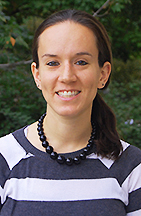News Archive
Ellen Matson receives 2017 NSF CAREER Award
 Congratulations to UR Chemistry Assistant Professor Ellen Matson who is the recipient of a 2017 CAREER Award from the National Science Foundation for her proposal entitled “Synthesis, Characterization and Reactivity of Iron-Functionalized Polyoxovanadate-Alkoxide Clusters for the Activation of Small Molecules.” The Faculty Early Career Development (CAREER) Program is a Foundation-wide program that offers the NSF's most prestigious awards in support of junior faculty who exemplify the role of teacher-scholars through outstanding research, excellent education and the integration of education and research within the context of the mission of their organizations. Such support is expected to help build a firm foundation for a lifetime of faculty leadership in integrating education and research.
Congratulations to UR Chemistry Assistant Professor Ellen Matson who is the recipient of a 2017 CAREER Award from the National Science Foundation for her proposal entitled “Synthesis, Characterization and Reactivity of Iron-Functionalized Polyoxovanadate-Alkoxide Clusters for the Activation of Small Molecules.” The Faculty Early Career Development (CAREER) Program is a Foundation-wide program that offers the NSF's most prestigious awards in support of junior faculty who exemplify the role of teacher-scholars through outstanding research, excellent education and the integration of education and research within the context of the mission of their organizations. Such support is expected to help build a firm foundation for a lifetime of faculty leadership in integrating education and research.
Using this award, Professor Ellen Matson and her research group will investigate the synthesis and reactivity of a family of iron-functionalized polyoxovandate-alkoxide clusters. These hexanuclear, multi-metallic, Lindqvist clusters possess rich redox chemistry, making them ideal platforms for the mediation of multi-electron transformations pertinent to the activation of small molecules (e.g. CO2. N2, NOx, etc.). In addition to establishing a general synthetic route to access iron-functionalized polyoxovanadate-alkoxide clusters, Dr. Matson is working to develop an understanding of the electronic properties of these delocalized systems through stoichiometric redox reactivity. These research efforts are generating a unique class of metalloligands to support multi-electron transformations using first-row transition metal centers; with a focus on the ability of the metal-oxide framework to serve as a redox-active reservoir. Dr. Matson is actively engaged in multiple outreach initiatives targeted at facilitating dissemination of scientific content to young students. The research and outreach initiatives ongoing in the Matson Lab will lead to significant broader impacts on chemistry education and research within the community.
For more information, view the NSF Abstract.
Related Links...
